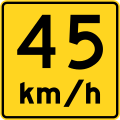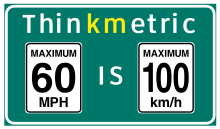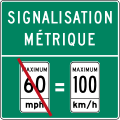Speed limits in Canada
Canadian speed limits have been posted in kilometres per hour (km/h) since 1977. Before then, when Canada used Imperial units, speed limits were in miles per hour (mph).
Statutory speed limits
Statutory speed limits are default speed limits set by a statute in each province or territory. They apply on roads which do not have posted speed limits. Posted speed limits may differ from the statutory speed limit as indicated by speed limit signs.
In most provinces and territories, statutory speed limits are 50 km/h in urban areas, 80 km/h in rural areas. [1][2] There is not a statutory speed limit for grade-separated expressways, however the typical speed limit in most provinces is 100 km/h. Statutory speed limits for school zones tend to be 30 or 40 km/h in urban areas and 50 km/h in rural areas.[3]
Where a dash (–) is indicated, there is no statutory speed limit: speed limits must always be posted. Where N/A is indicated, there is no such roadway in the province or territory.
| Province or Territory | School Zone (urban / rural) |
Urban | Rural (local / highway) |
Expressway | Highest speed limit |
|---|---|---|---|---|---|
| Alberta | 30 / 30 | 50[4] | 80 / 100 | 110[4] | 110 |
| British Columbia | 30 / 30[5] | 50[6] | 80[6] | 110 / 120[6] | 120[7][8] |
| Manitoba | 30 / 50 | 50[9] | 80 / 100 | 100[9] | 110[10] |
| New Brunswick | 50 / 50[11] | 50[12] | 80 / 90 | 110 | 110 |
| Newfoundland and Labrador | 50 / 50 | 50[13] | 80 / 100 | 100 | 100 |
| Northwest Territories | –[14] | 45[15] | 90 / 100 | N/A | 100 |
| Nova Scotia | 30 / 50[16] | 50[17] | 80 / 90 | 110 | 110 |
| Nunavut | N/A | ||||
| Ontario | - | 50 | 80 | 100 | 100 |
| Prince Edward Island | – / 60 | 50[18] | 80 / 90 | N/A | 90 |
| Saskatchewan | – | – | 80 / 100[19] | 110[20] | 110 |
| Québec | 30 / 50[21] | 50[22] | 90 / 90 | 100 | 100 |
| Yukon | 30 / 40[23] | 50[24] | 50[25] | N/A | 100 |
Regulations

School zones
In Ontario, speeding fines double in areas identified as "Community Safety Zones"
Construction zones
In most Canadian provinces, as in most other locales, speed violation fines are double (or more) in construction zones, although in Ontario and Alberta, this only applies if workers are present in the construction zone.
Street racing
In Ontario, as of September 2007, drivers caught speeding 50 km/h over the posted speed limit have the vehicle that they are driving impounded immediately for 7 days and their license suspended for 7 days and have to appear before the court. For a first conviction, they face an additional $2,000-$10,000 fine and 6 demerit points; they may also face up to 6 months in jail and licence suspension of up to two years. For a second conviction within 10 years of the first conviction, their license may be suspended for up to 10 years.[26]
Truck speed limiters
In Ontario and Québec, trucks must be electronically limited to 105 km/h.
Radar detectors
Radar detectors in Canada are legal only in British Columbia, Alberta, and Saskatchewan. They are illegal to use in Newfoundland and Labrador, Nova Scotia, Prince Edward Island, New Brunswick, Quebec, Ontario, Manitoba, Yukon, Northwest Territories and Nunavut. Regardless of whether they are used or not, police and law enforcement officers there may confiscate radar detectors, operational or not, and impose substantial fines in provinces where radar detectors are illegal.[27] Quebec penalizes $500 CAD for use of a radar detector, along with confiscation of the device.[28]
Signage
A speed limit sign reads "MAXIMUM XX", such as "MAXIMUM 80" for 80 km/h. A minimum speed sign reads "XX MINIMUM", such as "60 MINIMUM" for 60 km/h.
-

Speed limit sign
-

Minimum speed limit sign
-

Speed limit sign in Ontario
-

Speed limit sign in British Columbia and Yukon
-

Speed-restricted zone ahead sign
-

Speed-restricted zone ahead sign in British Columbia and Yukon
-

Speed-restricted zone sign in Ontario
-

Speed-restricted zone sign in Quebec
-

Speed-restricted zone ends sign in British Columbia
-

Advisory speed sign
-

Exit advisory speed sign in Quebec; Anglophone signs read EXIT or RAMP
-

Exit advisory speed sign in Ontario
-

Metric signage reminder in British Columbia, posted near US border
-

Metric signage reminder in Quebec, posted near US border
Review of speed limits
British Columbia
In British Columbia, a review of speed limits conducted in 2002 and 2003 for the Ministry of Transportation found that posted limits on investigated roads were unrealistically low for 1309 km and unrealistically high for 208 km. The report recommended increasing speed limits on multi-lane limited-access highways constructed to high design standards from 110 km/h to 120 km/h.[29] As described in that report, the Ministry is currently using "...Technical Circular T-10/00 [...] to assess speed limits. The practice considers the 85th percentile speed, road geometry, roadside development, and crash history."
Ontario
Speed limits on Ontario freeways were lowered from 70 miles per hour (110 km/h) to 60 miles per hour (97 km/h) during the 1970s energy crisis[30] and remained at the nearest equivalent (100 km/h) upon conversion to metric measurements in 1977.
In Ontario, "speed too fast" is responsible for just 2.1% of road fatalities,[31] while "speeding" accounts for 55.4% of all driving convictions.[32] A Ontario-based group is lobbying to increase speed limits from 100 km/h to 130 km/h.[33]
References
- ↑ http://www.tourismpei.com/drive-to-pei
- ↑ http://www.gov.ns.ca/snsmr/rmv/handbook/DH-Chapter2.pdf
- ↑ http://novascotia.ca/tran/roadsafety/schoolzonesafetyq&a.asp
- ↑ 4.0 4.1 http://www.transportation.alberta.ca/1951.htm
- ↑ [RSBC%201996%20c.%20318/00_Act/96318_05.xml#section146 Motor Vehicle Act], R.S.B.C. 1998, c. 318, s. 147(1)
- ↑ 6.0 6.1 6.2 [RSBC%201996%20c.%20318/00_Act/96318_05.xml#section146 Motor Vehicle Act], R.S.B.C. 1998, c. 318, s. 146(1)
- ↑ http://globalnews.ca/news/1428309/speed-limits-going-up-on-some-b-c-highways
- ↑ http://news.nationalpost.com/2014/07/03/b-c-speed-limit-bump-to-120-kmh-reflects-growing-consensus-that-faster-is-often-safer/
- ↑ 9.0 9.1 http://residents.gov.mb.ca/print,driving.html
- ↑ http://news.gov.mb.ca/news/print,index.html?item=5575
- ↑ http://www2.gnb.ca/content/dam/gnb/Departments/ps-sp/pdf/drivers_vehicles/driverhandbook/DH_part7_e.pdf
- ↑ http://www2.gnb.ca/content/dam/gnb/Departments/ps-sp/pdf/drivers_vehicles/driverhandbook/DH_part4_e.pdf
- ↑ http://www.servicenl.gov.nl.ca/drivers/DriversandVehicles/driverLicensing/roadguide.pdf
- ↑ http://www.dot.gov.nt.ca/_live/documents/content/13-04-17%20-%20Basic_Drivers_April%2017%202013.pdf
- ↑ http://www.dot.gov.nt.ca/_live/pages/wpPages/RLS_FAQ.aspx
- ↑ http://novascotia.ca/tran/roadsafety/schoolzonesafetyq&a.asp
- ↑ http://www.gov.ns.ca/snsmr/rmv/handbook/DH-Chapter2.pdf
- ↑ http://www.gov.pe.ca/photos/original/tpw_dh_full07.pdf
- ↑ http://www.qp.gov.sk.ca/documents/english/Statutes/Statutes/T18-1.pdf
- ↑ http://www.gov.sk.ca/news?newsId=0ac2e71b-d06f-4b82-8792-a3ef540a232e
- ↑ http://www.saaq.gouv.qc.ca/en/road_safety/behaviour/children/schoolbus_transportation/motorists.php
- ↑ http://www.saaq.gouv.qc.ca/en/road_safety/behaviour/speed/limits/index.php
- ↑ Motor Vehicles Act, R.S.Y. 2002, c. 153, s. 140(4)
- ↑ http://www.hpw.gov.yk.ca/pdf/Drivers_Handbook_web_BOOK_Feb7_2013.pdf
- ↑ Motor Vehicles Act, R.S.Y. 2002, c. 153, s. 138(1)
- ↑ "DRIVING THE SPEED LIMIT". Ontario Ministry of Transportation. Retrieved 15 February 2012.
- ↑ "United States Department of State: Consular Information Sheet for Canada". Travel.state.gov. Retrieved 2010-10-17.
- ↑ http://www.bonjourquebec.com/qc-en/faqvoyager0.html
- ↑ MoT Speed Review Report
- ↑ http://www.thekingshighway.ca/faq.htm
- ↑ "Table 2.8: Apparent Driver Action by Class of Collision, 2011". Ontario Ministry of Transportation. 2011.
- ↑ "Table 7.2: Motor Vehicle Convictions Related to the Highway Traffic Act, 2011". Ontario Ministry of Transportation. 2011.
- ↑ http://digitaljournal.com/article/323216
| ||||||||||